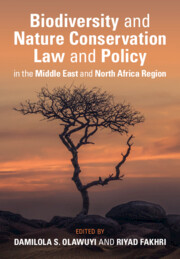Damilola S. Olawuyi is a full professor and UNESCO Chair on Environmental Law and Sustainable Development at the Hamad Bin Khalifa University College of Law, Doha, Qatar. He is also the Chancellor’s Fellow and Director of the Institute for Oil, Gas, Energy, Environment and Sustainable Development at the Afe Babalola University, Nigeria. Professor Olawuyi holds a doctorate in energy and environmental law from the University of Oxford, an LL.M. from Harvard University, and another LL.M. from the University of Calgary. He is an independent expert on the United Nations Working Group on Business and Human Rights, Vice Chair of the International Law Association, and Chair of the Association of Environmental Law Lecturers in Middle East and North African Universities (ASSELLMU). He was formerly an independent expert on the African Union’s Working Group on extractive industries, environment, and human rights violations in Africa.
Professor Olawuyi has published more than 150 articles, books, and reports on energy, environment, and natural resources law, including Environmental Law in Arab States (2022), which received the 2023 American Society of International Law Certificate of Merit for High Technical Craftmanship and Utility to Practicing Lawyers. Professor Olawuyi is a regular media commentator on all aspects of natural resources, energy, and environmental law. Further information about his profile and publications can be found at www.damilolaolawuyi.com.
Riyad Fakhri is a full professor of law at Hassan 1st University in Settat, Morocco and Vice-Chair of ASSELLMU. He received his University Proficiency Certificate in March, 2007 and his State Doctorate in Business Law, First Class Honors, from the Law Faculty, University Ain Chems at Cairo, Egypt, 1996–2000. He served as the Vice-President (in charge of pedagogical and academic affairs) of Hassan 1st University in Settat, and from 2005 to 2012 as the Vice-Dean (in charge of pedagogical and academic affairs) of the Faculty of Law. Dr. Fakhri is a representative member of the administration of the joint committee of Hassan 1st University and has been the Founder and Director of Research Laboratory in Business Law since 2009. In addition, Dr. Fakhri has held posts as the President of the Pedagogical Commission of the Council of Hassan 1st University of Settat since September 2012 and the Director of the Joint Research Center on the Belt and Road Initiative and Sino-Moroccan Relations since April 2018. Dr. Fakhri is the author and director of several national and international scientific publications, books, and articles in the field of business law in three languages: Arabic, French, and English. Furthermore, Dr. Fakhri is an active member of the board of several civil associations, is a supervisor of more than seventeen defended doctoral theses, and is currently supervising more than seven doctoral theses. Moreover, Dr. Fakhri is a member of the jury of defense of several doctoral theses at the national and international level (in Morocco and France), the Academic Director of the website www.droitetentreprise.com, and the Academic Director of the journal Le droit et les affaires.

